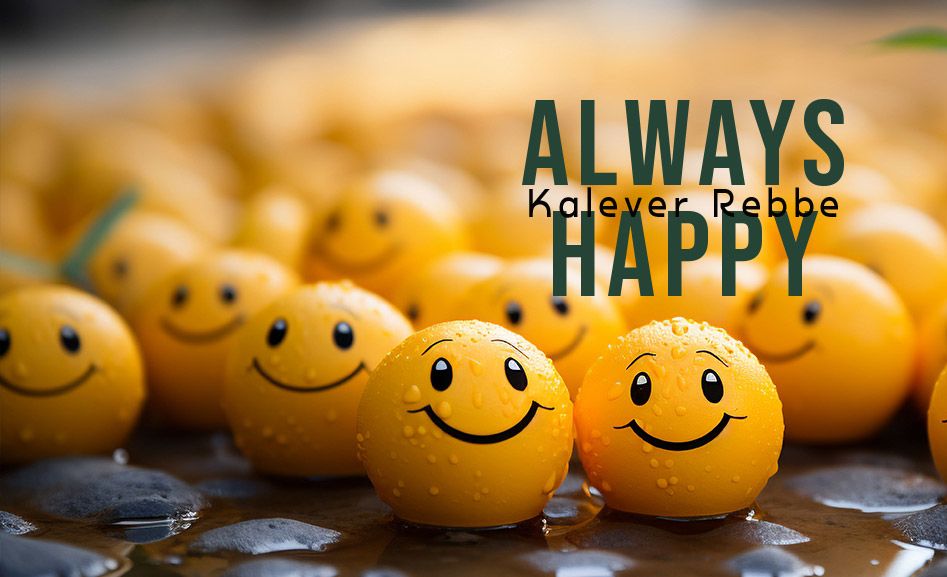
Grappling with Free Choice
We can’t understand certain concepts as long as our souls are trapped within a physical body, so we must accept the idea that we’re not on Hashem’s level…

A little while ago, I was talking to one of my good friends about free choice. They were struggling with the whole concept that a person can have free choice – and is held accountable for every little thing they do – but that ultimately, G-d is doing everything.
 They wanted to know, how can a person have free choice if G-d is the One ‘doing’ everything, including our sins?
They wanted to know, how can a person have free choice if G-d is the One ‘doing’ everything, including our sins?
It’s a great question: in fact, Rabbi Nachman explains that this particular question is at the root of every philosophical challenge; every theoretical ‘problem’; and every heretical viewpoint.
Why? Because Rabbi Nachman teaches that no-one – not even someone of Rabbi Nachman’s immense spiritual stature – can really get to the bottom of that question, for as long as they are in their bodies.
When Hashem created the world, He had to ‘remove Himself’ from the physical world, so-to-speak, in order for people to have free will. Free will is the whole reason people were created in the first place, and it’s the basis of reward and punishment.
Just imagine, if every time you did something wrong, G-d sent you an electric shock; or if every time you did something right, you got a check in the post for a million dollars.
You would have to be literally insane to step out of line, or turn down the chance to do a mitzvah. But then, if the reward for doing good was so immediate and so obvious, and the ‘punishment’ for doing bad so immediate and nasty, free choice would disappear.
Instead of being a population of thinking, praying, striving human beings, we’d be no better than Pavlov’s dog – and we certainly wouldn’t be ‘deserving’ of any additional, spiritual reward when we got upstairs.
You don’t understand it all? Neither do I. Neither does anyone. But this is the crucial part: Rabbi Nachman goes on to say that anyone who insists on trying to fathom the mystery of the ‘vacated space’, as it’s called in Breslev teachings, will either go mad, or become a heretic.
We can’t really understand the concept of free choice because we aren’t G-d. It’s that simple. But if we have trouble accepting the idea that we’re not on the same philosophical level as the A-lmighty, that’s when the real problems begin.
I have had loads and loads of conversations with so-called ‘frum’ people who have trouble accepting this most basic tenet of Judaism, namely that Hashem runs the world. All of the world. Even the details. Even the ‘bad’ stuff. Even the bits they don’t understand.
It simply doesn’t make sense to them – and it doesn’t to anyone else either, because as we’ve just pointed out, none of us are G-d. But that answer apparently isn’t good enough for them.
One person spent an hour going on about how G-d gave him a very good brain, and G-d expects him to use it to ‘answer’ questions like this. It was an excruciating conversation for me, because the person was so full of themselves, and so full of their ‘first class education in philosophy’, and so full of all the nonsense they learnt in university, that they simply couldn’t hear the simple fact that they weren’t G-d, and therefore, they couldn’t understand all of G-d’s ways.
Even Moshe Rabbenu, the greatest teacher we ever had, the greatest prophet that ever lived, who spoke with G-d face to face, couldn’t know all of G-d’s ways. But this man was different. This man was clever! And he had a first in philosophy from a prestigious university! And if His degree didn’t entitle him to understand G-d, then clearly, something was wrong.
About a year after that difficult conversation, I found out that he and his wife had stopped keeping Shabbat, stopped dressing modestly, and were sliding off the derech at about four million miles an hour.
And they aren’t the only ones. Rabbi Nachman warns his followers again and again about the dangers of becoming trapped in sophisticated philosophical arguments. He writes again and again that simple emuna is the polar opposite of ‘philosophy’; the two simply can’t co-exist.
Which is where we come to a terribly profound problem in today’s Jewish world. In today’s Jewish world, there are so many rabbis and Jewish educators who are ‘experts’ in all sorts of philosophy; Jewish philosophy, comparative philosophy, Greek philosophy, whatever. A lot of them even have PhD’s in philosophy, because clearly, it’s impossible to ‘know’ G-d, or to teach about Judaism, without first having gone to university.
But as we’ve just learnt, philosophy and simple emuna are polar opposites. Every time someone starts spouting clever, complicated philosophical ideas requiring lots of big words and a dictionary; or coming up with their own theories about how G-d runs the world; or voicing their complaints about the justice in the world, or pouring scorn on the whole idea of miracles being more than just ‘lucky’ natural coincidences; or arguing with the idea that G-d is bigger than their intellect – that person may well be an amazing philosopher. But they are also about as far away as a person can be from having real emuna, or really believing in the authentic, genuine, Jewish concept of G-d.
This world is a world of confusion and darkness. It’s a place where so many of the very people who should be teaching us emuna and helping us to get closer to G-d are themselves trapped – far away – in philosophical posturing and sophistry.
But Rabbi Nachman also foresaw this. He wrote that at the end of days, ‘big rabbis would have heresy dripping out of their pockets’. This sounds amazing, doesn’t it? But the more you try to have simple emuna, the more you see that it’s true.
Philosophy and emuna don’t go together. If someone claims they do, they don’t know what it really means to have emuna, where you accept G-d at face value, and you don’t demand explanations for everything He does in the world.
We humans can’t understand G-d’s ways. Full stop. All we can do is believe in G-d, and His goodness, and His omnipotence. That’s the path of emuna. That’s the path set out by Rabbi Nachman and taught by Rav Arush. It’s the path of believing Jews down the ages – including the Rambam – and it’s the path that will bring us peace of mind; solutions to our problems; and ultimately, Mashiach. May it be speedily, sweetly, and in our days.










10/26/2011
Incredible article!! I absolutely loved this piece. Keep them coming!
10/26/2011
I absolutely loved this piece. Keep them coming!
5/18/2011
Free Will and Choice Thanks Rivka i was having trouble with this concept and i came to ure article,something i have been wondering and struggling with